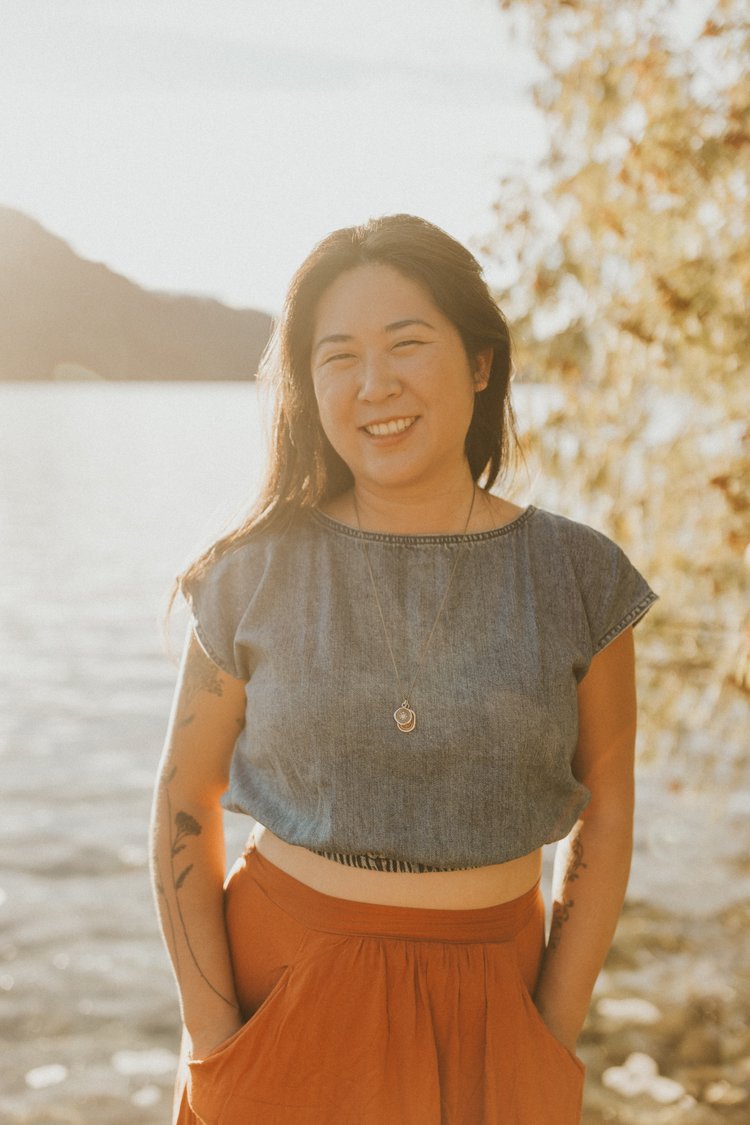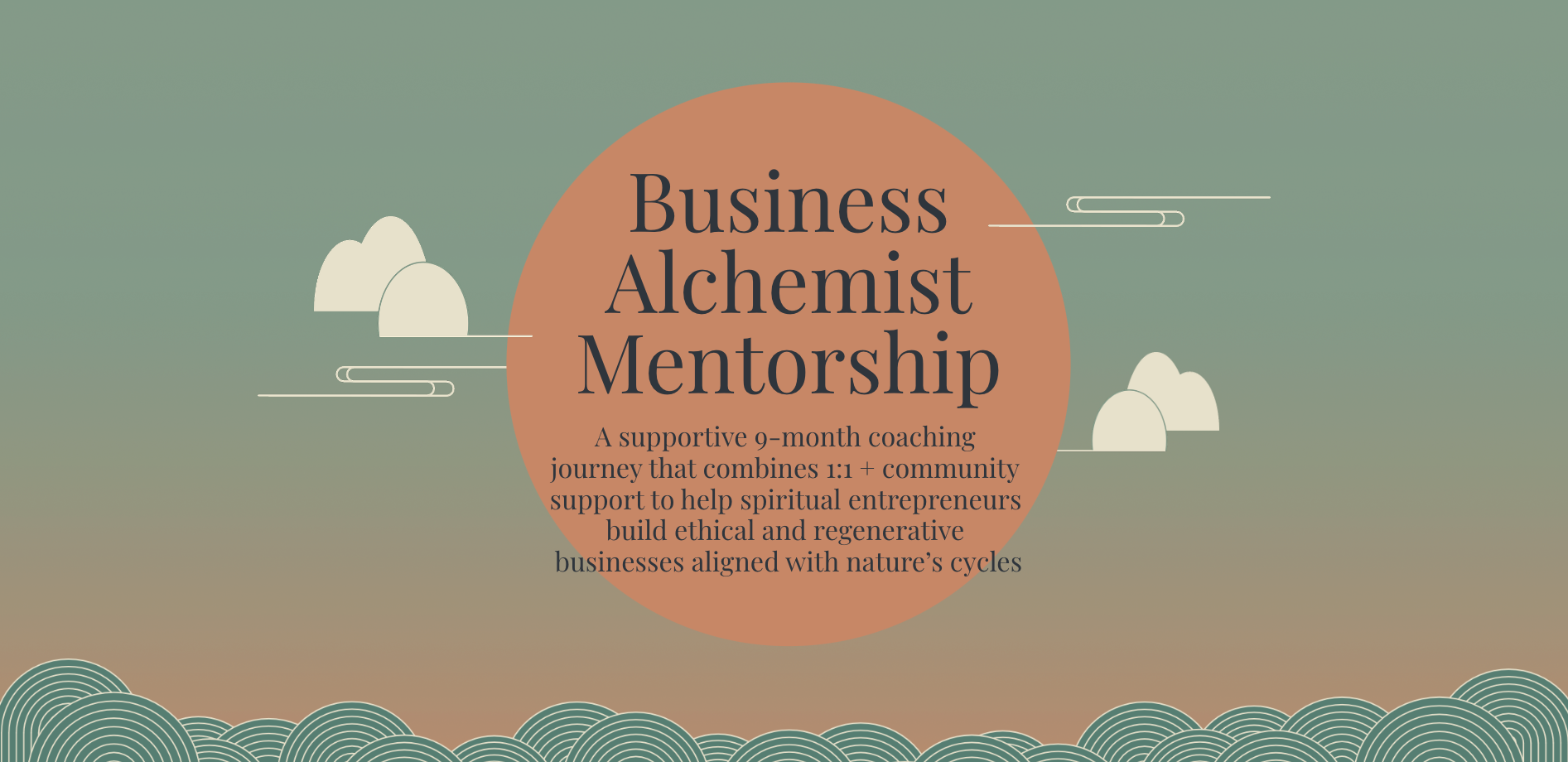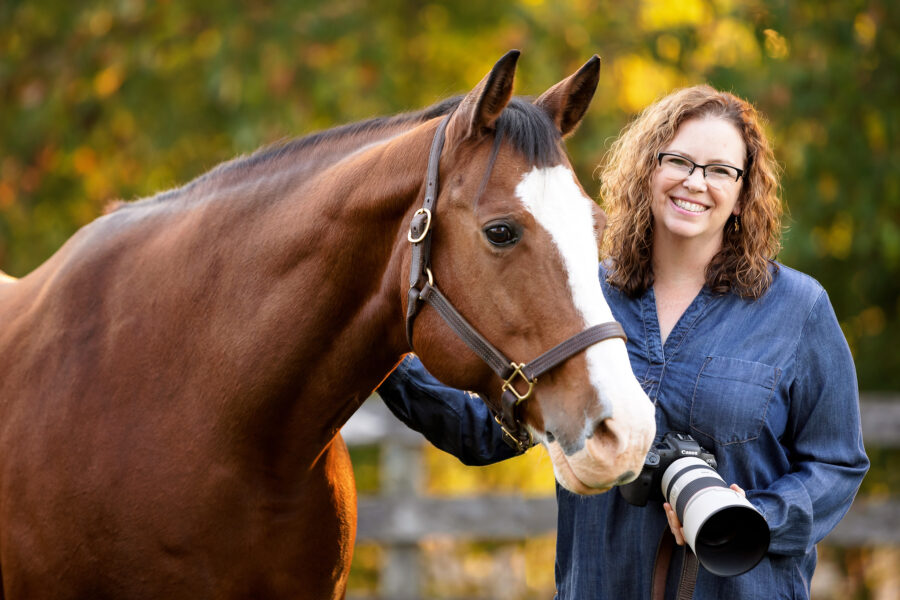Spokane, Washington-based Kat Lee runs her business differently than most online course creators.
As a spiritual business coach and the owner of Empowered Curiosity, Lee resists hustle culture and believes that entrepreneurs can become successful from slowing down, instead. With a background as an acupuncturist, Lee’s understanding of the body— specifically the nervous system, which oversees our stress response—has informed much of her work as an online coach.
“Oftentimes in business, we tend to override the discomfort that we feel in our bodies,” Lee tells Thinkific. “Many people think there’s something wrong with them because they feel burnt out, but there is so much wisdom in the body; it’s speaking through the only language it knows, which is signs and symptoms.”

While most people become exhausted after their first year or two in business, Lee believes that creators can approach their entrepreneurial path with a different lens—one in which centers slowness and sustainability as the cornerstones of maintaining one’s well-being. “In our culture, we’ve been told to hustle, over-give and over-do in pretty much every aspect of our lives,” she says. “Slowing down is something we know we should do, but it can feel unsafe and a bit foreign nowadays.”
“When you’re hustling, you can make a lot of mistakes along the way,” continues Lee. “I often think about how much time I would have saved if I had slowed down in the beginning and thought about the values and ethics that my business stands on.”
Here, Lee recounts how she broke many of the business rules course creators subscribe to, offering digital entrepreneurs permission to slow down, listen to their bodies, and make choices from a place of alignment. The result: less burnout and a business that lasts for the long-haul. “If we as entrepreneurs can do the work of slowing down and listening to our bodies, we will feel more connected to our intuition,” she says.
Keep reading to learn how Lee developed new rules for her business, which led her to teach over 143 students through Thinkific.
Skip ahead:
- Success requires nurturing an audience
- You can pivot your offerings as you go
- You can listen to your body when making business decisions
- You can create online courses that integrate community
- You can keep your courses accessible through sliding scale pricing
- Your students can still have access to you as your business grows
- You don’t have to create content for the sake of creating content
- You can skip hard launches
- You don’t have to override discomfort to be successful
Rule #1: Success requires nurturing an audience
When Lee graduated acupuncture school in 2011, she realized how little she knew about starting a small business.
Through hard work (and a lot of struggle), she says she “cobbled together” her own acupuncture practice. Upon turning 30, she sold her business and moved to Vancouver, BC, where she joined an acupuncture practice in the city.
But working for someone else wasn’t what she thought it would be. “The clinic was in charge of the marketing, and I was getting frustrated with the lack of alignment that I felt with my clients,” she says. “Plus, living in Vancouver was expensive and I felt like I was working all the time and burning out.”
When the pandemic struck, Lee saw an opportunity to shift careers. Over the years, she’d built a small but loyal following on her Instagram account, @empoweredcuriosity. There, she shared writing related to wellness, personal development, and Daoist philosophy.
With her acupuncture practice on hold due to covid, she leaned into sharing more of her writing online. People resonated with Lee’s content, and she began getting requests from her Instagram audience for coaching. But Lee’s success didn’t happen overnight, despite her describing the transition from acupuncture to coaching as “fairly easy.”
“The reality was that there were several years where I was writing just to write, and I didn’t even know that I was nurturing an audience,” she explains. “When I put my hand up for coaching, I had a full practice within three months.”
Rule #2: You can pivot your offerings as you go
The idea that online course creators need to know exactly where they’re going at the beginning of their entrepreneurial journey isn’t only unrealistic, it’s simply not necessary.
Take it from Lee: First, she began her coaching practice as a relationship coach. When she found herself answering the same questions throughout her one-on-one coaching practice, she decided to create her first group relationship course.
She chose Thinkific to host her course as she liked the platform’s aesthetic.
“It organizes the information in such a way that it’s really calming and visually appealing to students,” she explains. “It’s also easy to use. I’m not super tech-savvy, so the fact that I could basically drag and drop things was important. Plus, for what it delivers, it’s a reasonable cost.”
Although she positioned herself as a relationship coach, more and more entrepreneurs reached out to her asking for advice on building their business.
“I think what was resonating with my audience was that I was open and honest about everything in my life, including business. They wanted to know how they could show up online and in their business in an authentic way, too,” she explains.
She shifted from relationship to business coaching early in 2021, after listening to her audience’s needs. “In the beginning, I didn’t put out an offering saying ‘hey, I’m a business coach now,’” she explains. “My community just started reaching out to me and asking for support, so the evolution of my business happened naturally. Now I have a robust ecosystem of offerings to support spiritual entrepreneurs.”
Rule #3: You can listen to your body when making business decisions
While business and spirituality seem like two opposing topics, Lee began bridging the two as a result of her own experience with running her acupuncture business. “I started thinking about how I could relate to my business with the same devotion that I relate to my relationships and spiritual practice,” she says.
The way in which she bridges business with spirituality is by helping her students to connect with their bodies, which is where Lee believes intuition resides.
“There’s a place in your body that tells you if you want to move towards or away from something. Oftentimes, the thing that blocks us from being able to communicate with our bodies is trauma,” explains Lee.
By helping her students to regulate their nervous systems—a key part of healing trauma, according to Lee—she teaches them to listen to their bodies’ signals as a way of creating a sustainable business in which they won’t burn out from. “Your body is your best business partner along your entrepreneurial journey,” she states.
Rule #4: You can create online courses that integrate community
Once shifting to business coaching, Lee launched the Business Alchemist Mentorship (BAM), which is a nine-month, application-only program for spiritual entrepreneurs. In this course, she helps folks align themselves with both the cycles of nature and their soul’s purpose to grow an ethical and regenerative business.

BAM walks people through five different modules that are based on the five elements of Daoist philosophy. She uses Thinkific’s Drip Schedule feature to release her content, and then students join small, six-person maximum group coaching cohorts. Students can also add on one-on-one coaching when they purchase the program. “I find that there’s a disconnect when folks are just given material; there’s a lack of integration that happens, which is why I feel like customized support is so important,” she says.
Her other two, smaller courses are Conscious Marketing Course + Community and Energetics of Money Course + Live Calls. Both of these courses are smaller than BAM and include approximately ten hours of self-study. However, she still integrates group coaching, since each course includes four live coaching calls every year. This allows students to meet each other, form community, and ask questions in real-time.
To further deepen this sense of community, students can connect over a group chat through Slack. “It’s been a cool way to bridge cohorts,” she says. “My first round of BAM graduated two years ago, and they’re able to network and respond to newer members’ questions in the Slack community, as well as share their experiences, insights and stories of their journey.”
Rule #5: You can keep your courses accessible through sliding scale pricing
Lee describes her audience as people who have tried other marketing courses and are looking for a new way to do business. “I tend to get folks who are recognizing that it’s not the tool and the strategy that they’re missing out on; it’s the integration and support that they’re craving.”
Further, many are inspired by Lee’s unique approach to marketing. “A lot of marketing practices out there feel so wrong to me,” Lee explains. “Many marketers tell us to pick a pain point until someone feels activated enough to work with us, and then we come in as this savior. I knew I wanted to work with people in a different way.”

Her audience is mostly made up of women aged 30-50. Many are located in the US and Canada, however she’s had a recent uptake of students from the UK. To increase accessibility to her courses, she offers each on a sliding scale.
She determines her sliding scale pricing by thinking about the price; If it feels like she’s over-giving and will become resentful with that number, then it’s too low. If the number feels uncomfortably out of reach for most of her audience, then it’s too high. If the number feels exciting to her, where she feels that she can be generous with her time, then it’s the right number. “I play with the numbers until I feel that my students will honor my time, wisdom, and are stretching themselves to invest.”
She feels like it’s important for people to be a little uncomfortable when investing in a course. “The investment I’m asking my clients to make is time, energy, and money,” she explains. “You must have some skin in the game; it can’t be super comfy and cozy all the time. You need to be a bit nervous—and excited—to grow.”
To collect payment, she integrates Stripe with Thinkific.
Rule #6: Your students can still have access to you as your business grows
Lee’s marketing strategy is simple: There are no complicated sales funnels, rather her time is focused on cultivating connections with her community. She does so through her Instagram, newsletter, and the Empowered Curiosity Podcast. She also hosts two, free community calls on a monthly basis: One is a Monthly Call for Spiritual Entrepreneurs, and the other is a Daoist Lunar Wisdom Community Call. To attend these calls, students sign up via email, which helps to build her email list. She also includes the email list sign-up in her podcast show notes and through her Instagram content.
Her intention behind creating these free community calls is to ensure that her community still has access to her—even while her business grows. “I’ve seen so many coaches whose communities have less access to them once their businesses expanded. It seemed like to grow, you had to make yourself less accessible. I didn’t want to participate like that.”
“For me, my business has always been about connecting and relating with people on a deep level, and I didn’t want to lose that,” continues Lee. “I wanted to expand through connection. I don’t want to just push someone along through a funnel that feels impersonal. These free calls give people an opportunity to be coached by me. If it resonates with them, then they can continue working with me through my courses.”
Rule #7: You don’t have to create content for the sake of creating content
According to Lee, there’s little value in putting out content for the sake of putting out content. Just like in other areas of her business, she markets her offers mindfully and with intention, applying a “quality over quantity” attitude. “There is so much noise out there,” she says. “I’ve heard from my audience members that they’ll look up my account because they know what I post will be meaningful.”
“So many business coaches tell people to post every single day,” she continues. “But what if it takes you three hours to write one post? It then becomes a full-time job to create marketing content, and it burns you out.”
Instead, she markets her program more organically through her existing content. Through her podcast, she includes an invitation at the beginning and end of the episode to continue working with her. “I find that folks normally listen to my podcast for a few months to get a sense of my values, ethics, and how I teach about business before working together further,” she explains.
Over Instagram, she gets lots of questions in her DMs, which she answers publicly (upon the user’s permission) so that she can make her knowledge widely accessible to her community. Through Lee’s newsletter, she offers longer form content on a regular basis to keep her audience engaged and informed of her offerings.
Rule #8: You can skip hard launches
To take care of her stress levels, Lee has stopped opening her courses for enrollment and closing the cart on specific dates. “I found this style of launching super activating to my nervous system,” she says. “I would have all these nerves about how many people would sign up. I noticed that it was activating my audience’s nervous systems, too, because it made me come at them with pushy energy for two weeks.”
Instead of having hard launches, she allows people to enter her courses on a rolling basis. “Anybody can sign up for Conscious Marketing or Energetics of Money at any time,” she says. “About a week before the live calls, which are spaced out every three to four months, I’ll put out some content to bring awareness to it. But people trickle into the courses when they’re ready for it.”
She offers BAM on a rolling enrollment basis as well, but in a different way. She lets anyone send in an application for the course at any time. Once she receives around six applications, she sets a date for the program and promotes it for two weeks to offer anyone a last-minute chance to join.
Rule #9: You don’t have to override discomfort to be successful
To further mitigate burnout, Lee has two team members who help her to run her business.
Her assistant puts together Lee’s content on Canva and handles administrative work, and her producer produces the podcast, edits video curriculum, and puts together her sales pages. This allows her to slow down and stay focused on her zone of genius, which is coaching and relationship building with current and potential clients.
Lee encourages folks to step into online course creation in a way that feels good for them, releasing the things they think they “should” do and instead listening to their bodies. “If hustle culture and ‘boss babe’ messaging doesn’t resonate with you, it doesn’t mean that there’s anything wrong with you,” Lee instills. “In fact, it probably means that you have a healthy body and nervous system that craves a more community-oriented way of doing business.”

“It doesn’t have to be one or the other,” she adds. “You don’t have to give up marketing your business or override your body in order to be successful. I think there’s something in the middle, which is hopefully what I’m able to provide for folks.”
If you’re ready to claim your entrepreneurial path, sign up for Thinkific today—for free!






